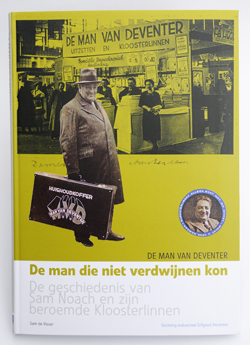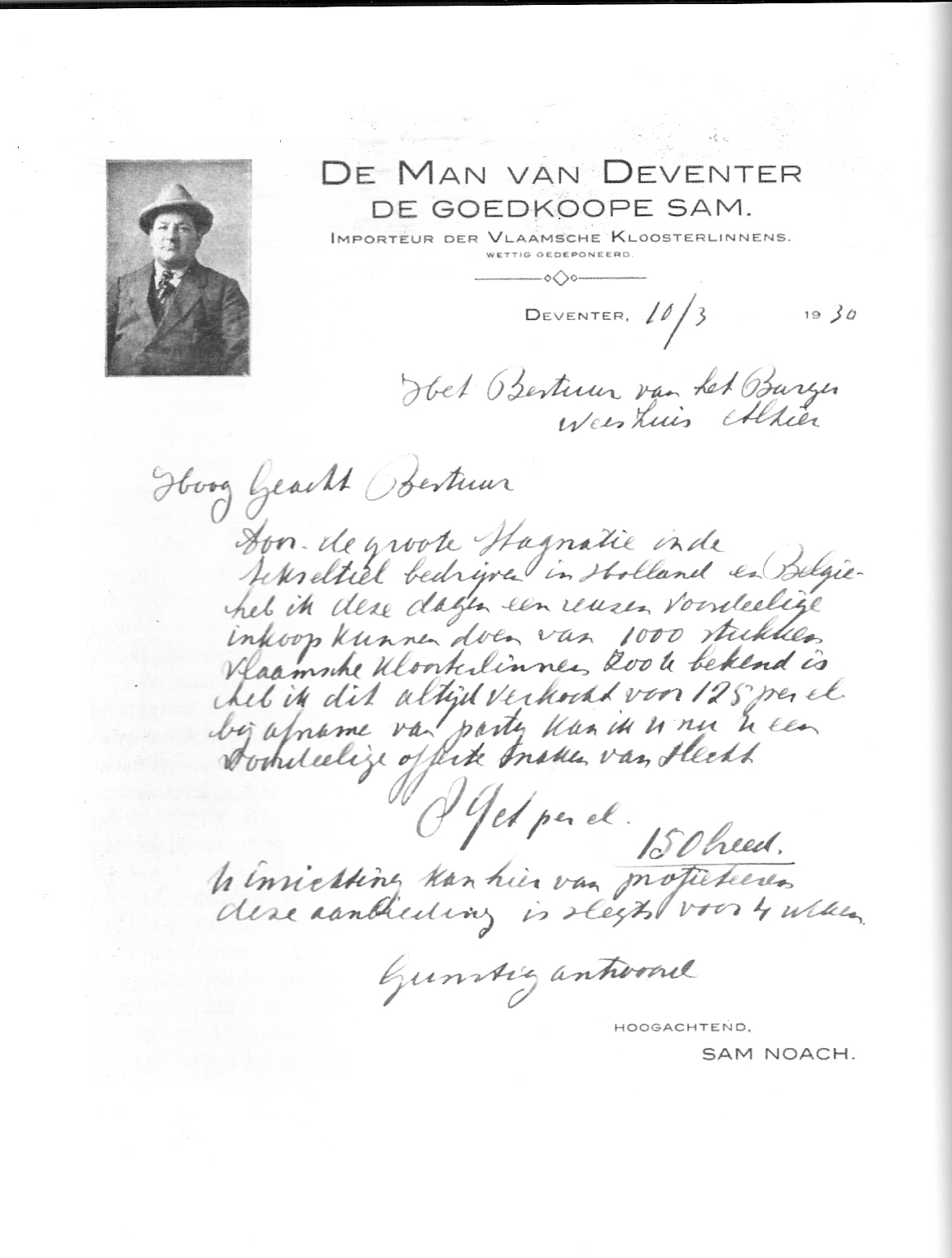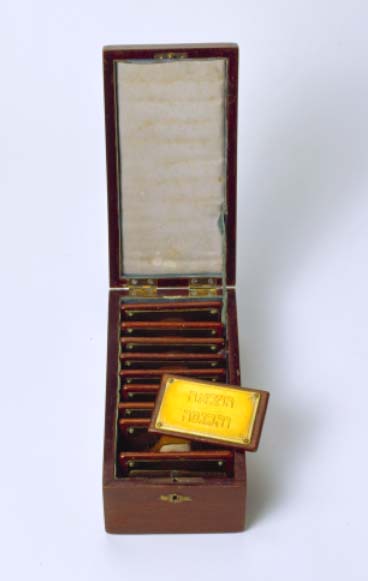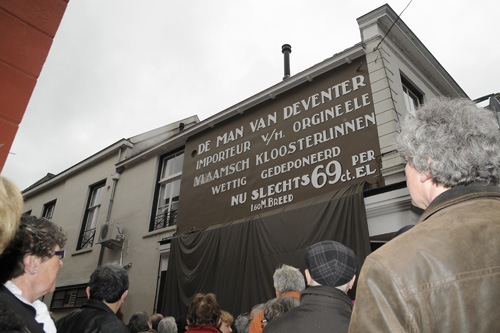The man from Deventer
"Cheap Sam"
The history of Sam Noach and his famous convent linen
Samuel (Sam) Noach was born in Deventer on 6 July 1882. He was the fourth son of Abraham Salomon Noach and Sophia Berg. They had nine children. They lived in Zutphen. Sam's father owned two shops, but the income was barely enough to support the family.
When he was eleven years old, he was taken from school, an usual practice at the time, and started working at pasting paper bags, which he didn't like at all. When he became 14 he left and was employed by Mr. Broekman in Zutphen, who traded in drapery. In those years much business was done by foot: From Zutphen to Apeldoorn, or to Lochem and sometimes, by local train to Doetinchem or to Deventer. He worked there for about four years and then moved to the firm of Horst, also in Zutphen.
In 1901 when he became 18 years old, he decided to start a business on his own. For many years he peddled his merchandise with a handcart, and later on by cart and horse, and did quite well. He started his trade under the name: "Cheap Sam."(“Goedkope Sam”)
In 1906 he married Bella Velleman from Friesland. They started a drapery shop and it prospered quite well, but he lost money with currency speculations. He cut his losses and started selling his merchandise on the market, were he was very successful. The press reported that Sam Noach succeeded with his jokes to attract more and more people eager to buy and that after a short time he was enjoying a large clientele.
In 1923 Sam moved with his wife and their three children, Abraham, Clara and Sophia, to Deventer. His father passed away in that same year. His first shop in Deventer was in the Hofstraat no. 5. The family lived there for five years, till the death of his wife in 1927. The family and the shop moved to the Nieuwstraat 57. In 1929 Sam Noach remarried with Betje van Gelder from Dordrecht.
As "The man from Deventer" he travelled throughout the country and built himself a good reputation.
Bram de Lange, Sam's cousin from Brussels, still remembered him and wrote: "Sam loved other people and was a very respected person. He had a boundless feeling for humor and did much for older people. Sam was quite bold, a kind of 'gotspe ponem,' but not irritating and he was never afraid to be in the foreground. What he did was tinged with humor and he always looked for the bright spots."
He never stayed in his shop, but was always travelling through the country. Everything he did had to be in a superlative way. For example he never bought 100 or 1000 sheets, but immediately a quantity of 10,000. He had no head for figures. After buying an article for five cents and selling it for one guilder he would conclude that he had made a profit of two percent! But he was very good in advertising and all his advertisements were always created by himself. He was not a very orthodox person. According to him you could believe in your faith, but you could not eat it. He was nevertheless devoted to the synagogue in Deventer, to which he often contributed.
Het Nieuw Israelitisch Weekblad from 29.04.1932 reported that in April 1932, with the inauguration of the restored synagogue of Deventer, Sam "surprised the community with a beautiful clock, with Hebrew figures. This was a present to the community, in view of his approaching 50th birthday. In a short humorous and original speech he expressed his feelings towards the Jewish community …"
A little box with "mizve discs," donated by him to the synagogue in 1929, has been saved. This item now forms a part of the collection of the Jewish Historical Museum in Amsterdam. ("Mizve discs" are small silver discs used in the synagogue when the several mizves-tasks related to the service divided among the community members-are handed out during the Shabbat service to the persons involved). We don't know on which occasion Sam Noach donated this item to the synagogue.
In his advertisements Sam Noach was able, without any difficulty, to make his person and his business a part of important events. Her loved to advertise. His great choice of merchandise was remarkable and his famous "convent linen" formed only part of his collection.
Nobody was able to arrange a sale like "Cheap Sam."
His advertisement from 1929 reads as follows:
"The heavy traffic has been shifted via the Brink and the Lange Bisschopstraat to the Nieuwstraat (the street where his shop was located). Therefore Cheap Sam has mobilized all doctors and the complete medical services of Deventer, in order to assist all victims who will succumb, when crowding each other on the sidewalk before the shop window of the Man of Deventer."
His business methods sometimes caused friction with his competitors, and even resulted in a lawsuit in Haarlem, with the accusation that his Flemish convent linen did not contain the required proportion between cotton and flax. A discussion on the subject arose. The police commissioner recalled the complaint, but Sam Noach nevertheless went to the judge. According to Sam's advertisements the case was concluded in his favor, but a small report in the paper showed that Sam's claim for restitution of 10,000 guilders was not accepted by the court and that according to the verdict het had to pay the court's expenses.
The Deventer daily newspaper reported that Sam did his utmost to avoid any trace of unreliability regarding himself and his product. Sam claimed that even some of the judges were using his Flemish convent linen at their home.
He grandly declared - not entirely true - that within a short time he would certainly be nominated a purveyor to the royal household. He said that originally he started selling "Belgian linen." When imitated by others, he changed to "Vlaams (Flemish) linen." When receiving the same reaction he chose "Convent linen." There followed a discussion with witness Ferwerda. Afterwards the textile manufacturer Rozendaal from Enschede declared that the Convent linen was a so called half linen and that the other fabric, shown to him for comparison, was of inferior quality. Finally Sam was exonerated from all blame.
It turned out that Rozendaal had financed part of Sam's shop in the Nieuwstraat and that there was a relation between the textile industry in Twente and the "Merchant from Deventer."
His convent linen was cheap because he brought it from Flanders, without using intermediaries. Finally the name "convent linen" was registered by the department of ownership, and connected to the "Man of Deventer." Under this name the fabric was advertised and that was the name appearing on the wall of his shop in Deventer.
Nowhere in the reference books of higher textile training, is any mention of "Flemish convent linen" found. The term "Flemish linen" does appear however. This fabric is defined as a coarse woven fabric, strong, half bleached, with a typical thickening in the fiber. In Flanders in homes and also in convents, there once existed a so called home industry, of spun flax and woven linen, but this industry disappeared around 1880 and Sam Noach could not have sold this fabric. It seems that the name "Convent linen" was invented by Sam Noach for advertising purposes.
As mentioned, advertising was greatly admired by Sam Noach. Large advertisements were placed in the 'Nieuws - and Advertentieblad for Deventer and surroundings Salland' when Sam opened his beautiful new shop in the Nieuwstraat, on 8 October 1931, after having been a merchant for 30 years.
Among the guests present were the burgomaster of Deventer, Wittewaal, and the lawyers who defended Sam during the trials in Haarlem and Zutphen. 125 flower arrangements were presented. But that was not all. His neighbors, all 280 elderly residents of the home for the eldery 'Groote and Voorster Gasthuis' participated, wishing to compliment him with his jubilee.
In September there was another party. This time it concerned the 40 year jubilee of his business life, which started in 1896 with the firm Broekman in Zutphen.
More than others, Sam Noach was convinced very early of the power of advertising. In a interview on the subject he said: "I have always fully appreciated the power of ongoing and effective advertising. With my constantly conducted advertising campaigns I have found the way to success. Spending money doesn't matter. If you persist it will doubly return to you. Even if I had to sell my house, I would continue to advertise."
Football was a dear subject for Sam. Children could be sure to receive a football, if their mother bought merchandise for a certain amount.
Sam Noach was well aware of living in a period defined by dramatic events. When Germany invaded Poland in September 1939, Holland declared complete mobilization. Nevertheless, in an advertisement from October that year, Sam announced that better days would certainly come. In the advertisement he anticipated a better future, with humor, but also in the silent hope that it really would come to pass.
A moment had come when Sam felt that Deventer had become too small for him. From 1926 onwards he became very much occupied in Amersfoort. Later on came Leiden and the Hague. For the preparation of his advertisements, Sam cooperated with the famous designer and drawer Philip van Praag, born in Amsterdam and active in Deventer. The brochures resulting from this cooperation, form a fine example of advertising during the twenties and the thirties of the previous century and also show the special feeling for humor of our merchant in convent linen. They were built like comic strips including advertisements.
And then the war broke out. In 1942 Sam was sent to a labor camp, de Wittebrink near Hummelo in the east of Holland. Afterwards he was sent to Westerbork and on 23 October 1942 he was transported to Auschwitz, where he was gassed on 26 October.
Recently the present tenant of the house in the Nieuwstraat in Deventer, where once the shop of Cheap Sam was located, became interested in the life story of this colorful business man. In cooperation with the Stichting Industrieel Erfgoed Deventer (SIED) – the foundation of preservation of the industrial history of Deventer – he intended to reconstruct the original painting on the wall of Sam's house and also to publish a booklet on his life.
On Friday, 7th May 2010, the unveiling of the wall advertisement took place, and the presentation of the book, titled: "The man who could not disappear - the history of Sam Noach and his famous convent linen," written by Sam de Visser, was published by the Stichting Industrieel Erfgoed Deventer (SIED).
This book, with some additions from the genealogy of the Noach family, formed the basis of this short life history of Cheap Sam, the man from Deventer.
Source:- "De Man van Deventer"- "De man die niet verdwijnen kon" by Sam de Visser (in cooperation with Otto van Huffelen)
Published by the SIED with cooperation of the following sponsors:
- coöperatiefonds van de RABO bank Salland
- Prins Bernhard Cultuurfonds
- gemeente Deventer, Fonds Deventer Geschiedenis
- Vereniging van Commercieel Vastgoed in het centrum van Deventer
- Leo van Biene
Extracted from the source:Yael Benlev-de Jong
Translation into English:Mechel Jamenfeld
Editing:Ben Noach
Final review:Hanneke Noach

The book: ”De Man van Deventer”
De man die niet verdwijnen kon by Sam de Visser (in cooperation with Otto van Huffelen)


Oproepplaatjes & Doos

On Friday, 7th May 2010, the unveiling of the wall advertisement took place, and the presentation of the book, titled: "The man who could not disappear - the history of Sam Noach and his famous convent linen," written by Sam de Visser, was published by the Stichting Industrieel Erfgoed Deventer (SIED).